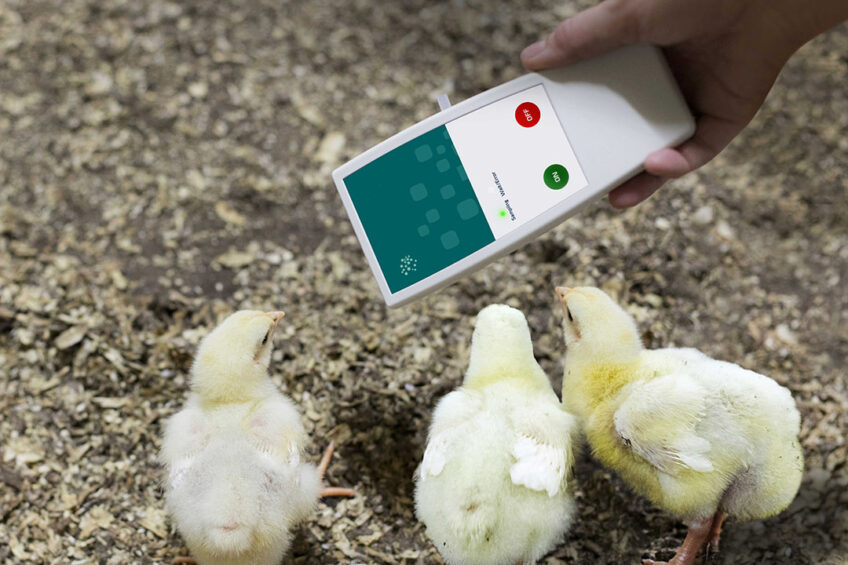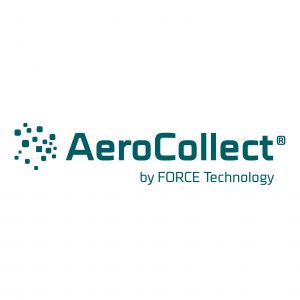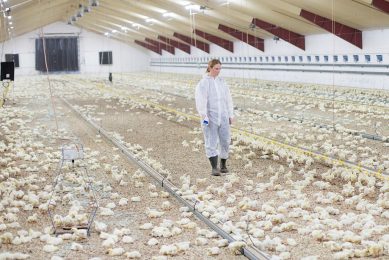Using smart technology to monitor the health status of poultry

A valuable collaboration with poultry group Danpo, has resulted in further improvements to the AeroCollect technology. These improvements not only safeguard producers from major operating losses, but they also reduce slaughterhouse costs, protect animals, and ultimately provide consumers with greater food safety.
Flock diagnostics has entered a new era. With AeroCollect technology, a single air sample can provide an overview of early-stage disease in an entire flock of poultry. The technology is Danish and developed by FORCE Technology, but without a close collaboration with poultry group Danpo, it would hardly have become as efficient as it is now, says Julia Skov, Team Manager for the team behind AeroCollect. “Danpo has been participating in development from the beginning. At FORCE Technology, we have a deep, expert-level understanding of the technology behind the air samples, but Danpo has the specific knowledge about the conditions present in production on the farms and in the slaughterhouses. They’re the ones that give us the access we need to test the technology in the field and collect data — so it was a natural fit for us to work with them,” she explains.
Danpo, too, sees great benefits in this collaboration. “This mutually beneficial collaboration, where we’ve received input on the development of the applications step by step, has been great. Most importantly, we have a new tool for rapid, efficient, and safe disease monitoring, and we’ve also gained important new epidemiological knowledge from this development project. Aside from that, it’s fun to be on the cutting edge, and to be among the first in the world to introduce a new measurement method,” says Jacob Roland Pedersen, Director of Live Production and Veterinary Affairs at Danpo.
The first stages
In the initial phase of the collaboration, Danpo’s producers collected samples from different poultry populations for the AeroCollect team. The aim was to narrow down pathogens relevant for the industry to monitor and to detect the pathogens with the equipment available at the time.
The next phase focused on validating individual pathogens (mainly campylobacter, IBV, and IBDV). In this phase, Danpo provided input on validation criteria, so that it is validated in a way that can be implemented logistically and helped identify relevant populations with a known status of infection where both AeroCollect and golden standard samples could be collected.
In parallel, the poultry industry also used AeroCollect to test particularly challenged populations for many different pathogens, in order to get an idea of what the best approach would be to get to the heart of the problem at different sites.
“Danpo has been a great help, and it’s been a pleasure to work with such a professional and innovative partner who wants the same thing as us: to create the proactive veterinary response of the future,” Skov says.
Facts – how AeroCollect works
AeroCollect works by pulling a flow of air through a small sample chamber. When collecting samples, high voltage is applied to the test chamber. This creates an electric field across the sample chamber that captures and concentrates bacteria, viruses, and other microscopic particles in the sample chamber.
The sample chamber is then sent to the laboratory where the content is analysed for pathogens using a qPCR analysis. The results are ready within 1-2 hours.
Disease library
The technology is being used by all of Danpo’s 100+ producers. The vision is for this technology to become a backbone of future veterinary prophylaxis, in which samples are routinely collected from all populations. After analysis, the samples are stored to serve as a library of disease trends across all populations over a period of six months, for example.
In this way, AeroCollect can safeguard producers from high operating losses, monitor vaccination efficiency more closely, protect animals, and ultimately provide consumers with greater food safety.
“We have one of the healthiest chicken farming operations in the world, and we use very limited quantities of antibiotics. This is due to good farming, the right feed, and the fact that we are good at spotting the first signs of disease and intervening accordingly. However, the idea that a live production won’t occasionally be affected by diseases is wishful thinking, and that’s where AeroCollect comes in. It helps us detect diseases early and easily,” Pedersen explains.
“The biggest advantage of AeroCollect, in my opinion, is the minimal impact on the animals. We don’t have to subject them to blood tests and so on. Instead, we can find out what’s going on in a population with a simple air test. That means that we can take early, targeted action. It would be very expensive — and bad for the animals — if we had to vaccinate all 45 million of our chickens against everything,” he adds.
Facts – about the AeroCollect technology
AeroCollect is a CE marked Danish technology that has been developed by FORCE Technology.
The technology is currently used in the mink and chicken industries, but it is also commercially available to the pig industry. It has also been demonstrated that the equipment can be used in cattle populations and the human pharmaceutical industry, but the technology is not yet commercially available for those areas.
Over 10,000 confirmed tests have been carried out using AeroCollect and the company has over 50 customers in 12 countries.
Vaccination collaboration
FORCE Technology’s current work with Danpo primarily involves routine sample collection from all of their populations to monitor Gumboro disease, so that vaccinations can be administered at the first signs of disease. The goal is to avoid multiple cycles of mild, untreated Gumboro and the operational losses that would follow.
The samples collected are also used for additional analysis in populations facing particular challenges. Lastly, a sample collection initiative for gaining a better understanding of vaccination dynamics has been launched. The aim is to optimise vaccination programmes, as well as to ensure that documentation is available to confirm that a vaccine has been administered correctly and that birds have received a vaccine.
Facts – Diseases that AeroCollect can detect
Salmonella
Campylobacter
Infectious bronchitis virus
Infectious bursal disease, Gumboro virus
Fowl Adenovirus
E. coli
Staphylococcus aureus
Avian reovirus
Chicken anime virus
Chicken astro virus
Avian metapneumovirus
Pasteurella
Mycoplasma synovia
Avian influenza virus
Avian encephalomyelitis
Marek’s disease virus
Join 31,000+ subscribers
Subscribe to our newsletter to stay updated about all the need-to-know content in the poultry sector, three times a week. Beheer
Beheer


 WP Admin
WP Admin  Bewerk bericht
Bewerk bericht